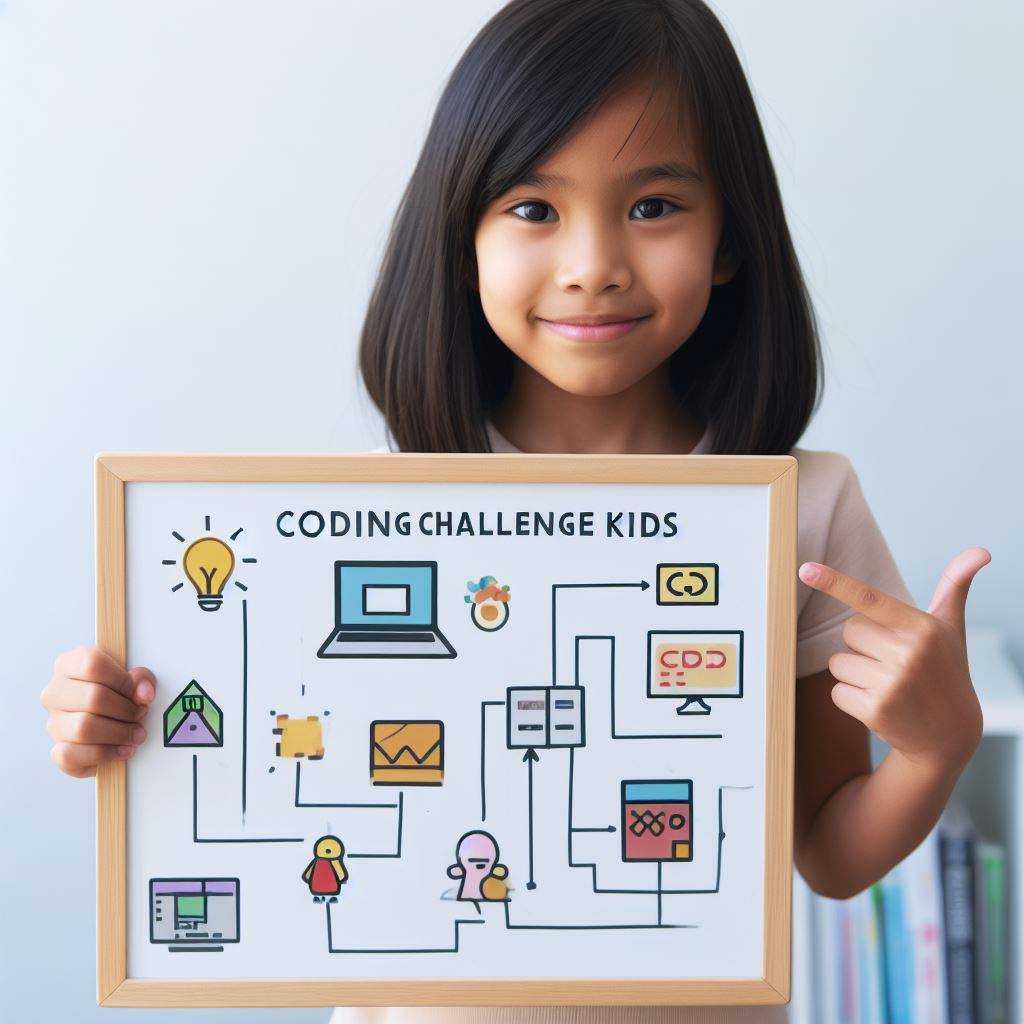Why Coding Challenges Are Important for Kids
Last Updated on October 7, 2023
Introduction
Coding challenges are a valuable tool for kids to develop crucial skills in problem-solving and critical thinking.
Explanation of coding challenges
Coding challenges are interactive tasks that require kids to write code and solve problems independently.
These challenges often mimic real-world scenarios, allowing kids to apply their programming knowledge and test their problem-solving skills.
Brief overview of why coding is important for kids
Coding is important for kids as it teaches them logical thinking, creativity, and how to break complex problems into smaller, manageable parts.
It also promotes teamwork, as kids often collaborate and share their solutions with others.
In today’s digital age, coding has become a foundational skill, opening up a wide range of career opportunities for kids in the future.
Moreover, coding empowers kids to be creators rather than just consumers of technology, fostering innovation and self-expression.
By engaging in coding challenges, kids build resilience, perseverance, and self-confidence as they tackle and overcome programming obstacles.
Therefore, coding challenges play a vital role in helping kids develop problem-solving skills and prepare them for a tech-centric future.
These challenges enable kids to acquire essential skills and instill a passion for programming from an early age, paving the way for their success and growth.
Read: Python on Khan Academy: A Comprehensive Review
Benefits of coding challenges for kids
Coding challenges are a valuable tool for kids to enhance their problem-solving skills and critical thinking abilities.
By engaging in coding challenges, kids can break down complex problems into smaller, manageable parts, fostering resilience and collaboration.
Promotes problem-solving skills
Coding challenges encourage kids to find solutions and overcome obstacles through analytical thinking and logical reasoning.
Encourages critical thinking and logical reasoning
Coding challenges require kids to think critically and use logical reasoning to come up with effective programming solutions.
Helps kids break down complex problems into smaller, manageable parts
Through coding challenges, kids learn how to break down complex problems into smaller, more manageable tasks, making problem-solving more achievable.
Enhances creativity
Coding challenges allow kids to think outside the box and find innovative solutions to programming problems, fostering creativity.
Allows kids to think outside the box and find innovative solutions
By participating in coding problems, kids are encouraged to think creatively and come up with unique solutions.
Offers opportunities to express themselves through coding projects
Through coding problems, kids have the chance to express their creativity and ideas through their coding projects.
Builds resilience and perseverance
Coding challenges require kids to keep trying, even in the face of failure, promoting resilience and perseverance.
Challenges help kids develop a growth mindset
By facing coding problems, kids learn to view failure as a learning opportunity and develop a growth mindset.
Teaches them to embrace failures as learning opportunities and keep trying
Coding problems teach kids that failures are an essential part of the learning process, encouraging them to keep trying.
Boosts collaboration and teamwork
Coding challenges encourage kids to communicate and collaborate with others to solve programming problems, promoting teamwork.
Encourages kids to communicate and collaborate to solve coding challenges
Through coding problems, kids learn how to work together with others and effectively communicate their ideas.
Fosters a sense of community among young coders
Coding challenges create a sense of community among young coders, providing them with opportunities to share their experiences and ideas.
Most importantly, coding problems offer numerous benefits for kids.
They enhance problem-solving skills, critical thinking abilities, and creativity.
Coding challenges also promote resilience, collaboration, and a sense of community among young coders.
Engaging in coding challenges is a valuable activity that can help children develop important skills for their future.
Read: 10 Mistakes to Avoid When Coding Your First Website

How coding challenges improve technical skills
When it comes to learning coding, challenges play a crucial role in enhancing technical skills.
These challenges push kids to think creatively and find innovative solutions to problems.
Let’s dive deeper into why coding problems are essential for kids:
1. Expands coding knowledge and expertise
Coding challenges expose kids to different coding languages and techniques, broadening their programming knowledge and expertise.
They get hands-on experience with various programming languages like Python, JavaScript, and more.
2. Develops familiarity with various coding concepts and algorithms
By participating in coding problems, kids develop familiarity with different coding concepts and algorithms.
They learn how to implement these concepts to solve real-world problems effectively.
3. Improves problem-solving and debugging abilities
Coding challenges boost problem-solving skills as kids face programming problems and errors that they need to fix.
By working through these challenges, they become better at identifying and fixing errors in their code.
4. Enhances ability to troubleshoot and find efficient solutions
When kids encounter various challenges, they become proficient in troubleshooting and finding efficient solutions.
They learn to analyze problems and come up with the best strategies to solve them.
5. Enhances computational thinking skills
Coding challenges enhance kids’ computational thinking skills.
They learn how to approach problems systematically, breaking them down into smaller, manageable steps.
6. Helps with understanding patterns, algorithms, and data structures
Coding challenges introduce kids to patterns, algorithms, and data structures.
They learn how to apply these fundamental concepts to solve coding problems efficiently.
In essence, coding problems are crucial for kids’ overall technical development.
These challenges not only expand their coding knowledge but also improve their problem-solving, debugging, and computational thinking abilities.
Encouraging kids to participate in coding problems provides them with valuable skills that can benefit them in the long run.
Read: 10 Must-Try Projects on Khan Academy’s Coding Courses
Practical Benefits of Coding Challenges for Kids
When it comes to the topic of why coding challenges are important for kids, the practical benefits cannot be underestimated.
From improving academic performance in STEM subjects to preparing them for future career opportunities, coding challenges play a significant role in a child’s development.
Better Academic Performance in STEM Subjects
Coding challenges have a positive impact on a child’s academic performance in STEM subjects.
- Coding strengthens math and science skills, as it requires logical thinking and problem-solving abilities.
- Through coding problems, kids learn how to transfer these problem-solving abilities to other subjects, enhancing their overall academic performance.
Preparation for Future Career Opportunities
Equipping kids with coding skills not only benefits their academic performance but also prepares them for future career opportunities.
- Coding skills are highly demanded in the current job market, where technology plays a vital role.
- By engaging in coding problems, kids develop digital literacy and a deep understanding of technology.
- These skills make them highly desirable candidates for future careers that require technological expertise.
Development of Digital Literacy and Technology Understanding
Coding challenges expose kids to the digital world, promoting the development of digital literacy and technology understanding.
- Through coding challenges, kids become familiar with different aspects of the digital world.
- They learn how to navigate technology, troubleshoot issues, and understand the underlying concepts.
- By engaging with coding problems, kids become well-prepared for the digital age and future technologies.
Basically, coding problems offer numerous practical benefits for kids.
Not only do they improve academic performance in STEM subjects, but they also prepare children for future career opportunities.
Additionally, coding problems foster the development of digital literacy and technology understanding, equipping kids with skills necessary for success in the digital age.
Encouraging kids to participate in coding problems is a valuable investment in their education and future endeavors.
Read: Improving Problem-Solving Skills with Coding Challenges
Conclusion
Coding challenges offer numerous benefits for kids.
They foster problem-solving skills, creativity, and logical thinking.
Coding challenges also enhance computational thinking and improve attention to detail.
It is essential to incorporate coding challenges into children’s learning journey.
These challenges help kids develop essential skills that are increasingly relevant in today’s digital world.
Parents and educators play a crucial role in providing coding opportunities for kids.
By encouraging and supporting coding activities, they can significantly impact children’s future success in various fields.
Therefore, let’s empower our children by introducing them to coding challenges and allowing them to explore their potential in a technology-driven era.


